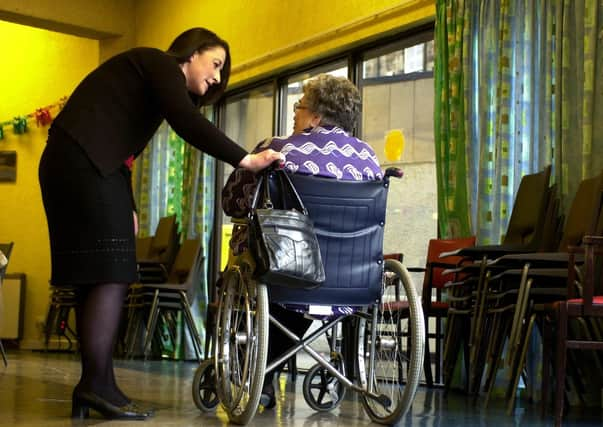Care sector fears new crisis over post-Brexit visa snub


Ministers were accused of “brass neck” after Downing Street called on care homes to increase pay and training and recruit more British staff to fill the shortfall, with bosses saying more attractive conditions required long-overdue reform and better public funding.
With about 17 per cent of carers coming from outside the UK, and vacancies before Covid-19 totalling around 122,000 – roughly a tenth of the workforce – unions warned a shortage of foreign workers would lead to greater use of agency staff that have been linked to the spread of the virus in care homes. Under the framework published for the UK’s new points-based immigration system yesterday, most care roles are judged to fall into the lowest skills level, meaning foreign workers would need to come to the UK as a dependent of someone else, or on another form of visa – for instance, as a student.
Advertisement
Hide AdAdvertisement
Hide AdA new health and care visa will fastrack applications and reduce fees for immigrants working in certain professions within the NHS, including nurses and midwives, but other care workers have been excluded.
There are also concerns at the exclusion of NHS porters and cleaners from the new visa route. People who want to live and work in the UK will need 70 points to apply for a visa. Points will be awarded for key requirements like being able to speak English to a certain level, having a job offer from an approved employer, and meeting a minimum salary threshold.
Asked if he thought there would be enough people coming in to work in the social care system, the Prime Minister Boris Johnsontold reporters: “I do,” adding: “We’re not going to be simply slamming the gates and stopping anybody anywhere coming into this country.
“Where people can contribute to this country, where people want to make their lives and do great things for this country, of course we’re going to have a humane and sensible system.”
Christina McAnea, the assistant general secretary of union Unison, said excluding care workers from the visa fast-track would “make existing problems spiral” in care homes.
“The sector is desperately short of staff and heavily reliant on the skills of overseas workers,” she said. “Recruitment will now become even harder.
“Ministers must get to grips with the massive issues facing social care, which only an urgent overhaul will fix.
“The huge vacancies in care can’t be filled simply by using newly unemployed workers.”
Advertisement
Hide AdAdvertisement
Hide AdRehana Azam, national secretary of the GMB union, described the rules as an “embarrassing shambles” which “make no consideration or acknowledgement of the vital job care workers have been doing these past few months”.
Satbir Singh, chief executive of the Joint Council for the Welfare of Immigrants, said: “We’ve gone from clapping for our key workers to calling them ‘low skilled’ in a few short weeks.”
Robert Kilgour, the chairman of Renaissance Care, which has 15 care homes across Scotland and employs 1,100 staff, called the decision “very disappointing”.
“It is going to make it more difficult to recruit after the transition period ends,” he told The Scotsman.
“I do worry about being able to recruit carers from abroad post-Brexit, because this health and social care visa isn’t really a health and social care visa – it’s an NHS visa.”
Last month Brian Bell, the new chairman of the Migration Advisory Committee, told MPs social care staff should be paid at least £10 an hour to help fill vacancies and avoid the need to rely on migrant workers. The Prime Minister’s official spokesman said yesterday: “We want employers to invest more in training and development for care workers in this country.”
But Mr Kilgour cast doubt on the sector’s ability to fill the gap left by foreign workers with British staff without additional funding from government to allow care providers to increase pay and training.
“It can’t be right that our staff would be paid more to stack shelves at Aldi and Lidl than do skilled jobs in my view in care, looking after our vulnerable elderly,” he said, adding that the UK government had a “brass neck” to call for better conditions before carrying out reform of the care sector.
Comments
Want to join the conversation? Please or to comment on this article.